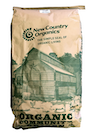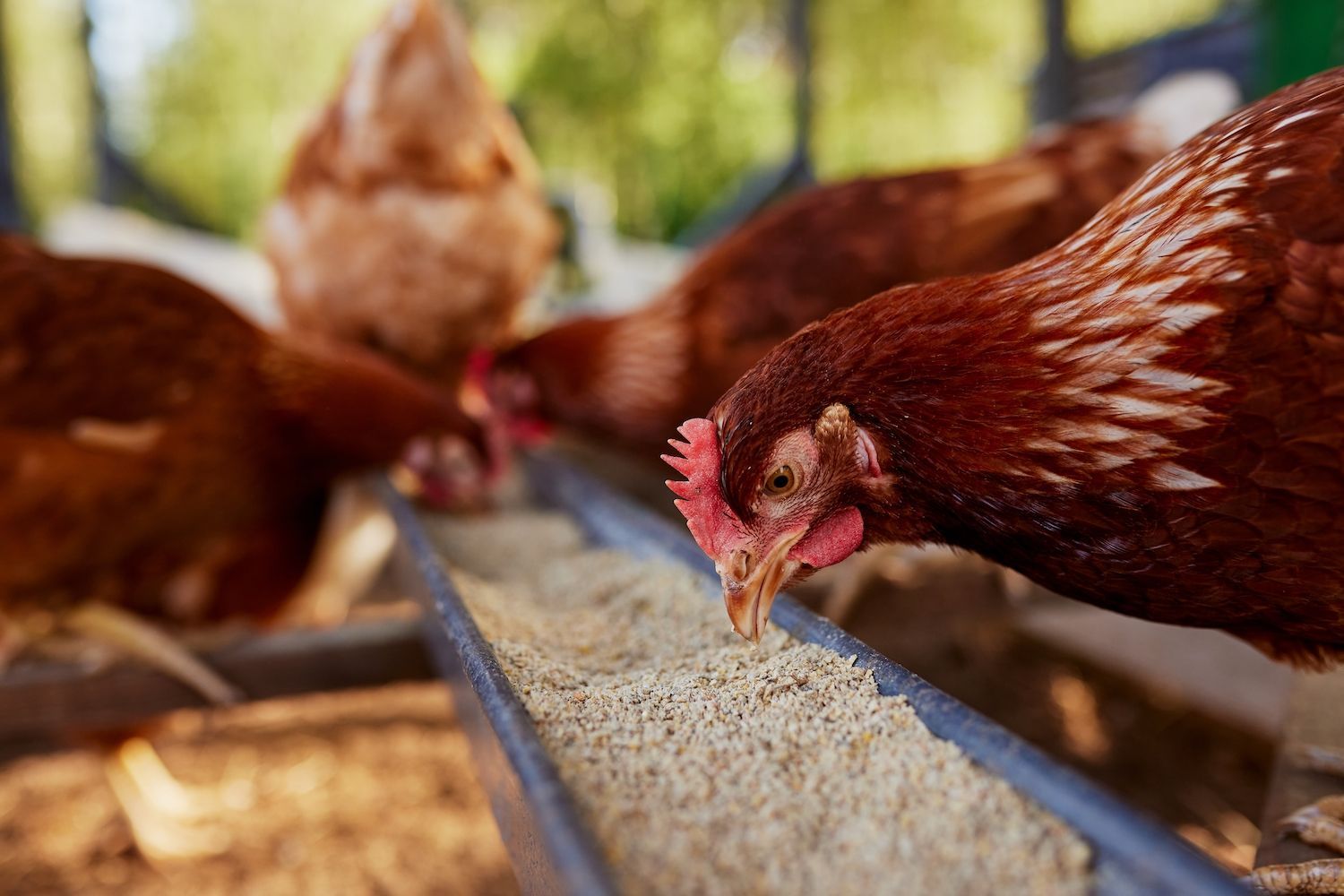It comes as a surprise to no one that everyone needs to eat their vitamins, including the livestock out in our yards and pastures. Knowing what vitamins, and what those vitamins do, however, is another story. Many of you have noticed these vitamins in our feeds, and have asked what their purpose is in the feed, so we made you this handy list of all the vitamins you’ll find in our labels and what their use is in the body.
Biotin
Also known as vitamin B7 or sometimes vitamin H, biotin is a necessary co-enzyme to several enzymes. In essence, this means those enzymes need biotin to work properly. These enzymes are vital to the energy cycle in cells, playing roles in breaking down carbs into glucose, preparing them to be made into fatty acids, or turning fats into energy. Without biotin, those processes stop, and biotin deficiency is usually seen first in the skin, feathers or coat, and hooves or claws where they become dry and brittle. Luckily, biotin is in grains, seeds, and some fruits and veggies, but since it leaves the body so easily it’s also nice to have a little extra boost.
Choline chloride
Sometimes known as vitamin B4, what doesn’t choline do? Choline is vital to the proper function of nerves and neurons, being one-half of acetylcholine, which is arguably the most important chemical in nerve-to-nerve communication. It also helps create cell walls, signal to platelets that it’s time to make a blood clot, transport fats to the right locations, and a host of other things. While most of the choline a barnyard pal needs is made by their own body, it’s still nice to get a boost of this since it’s so vital to so many body functions. The chlorine attached is also vital to many body functions, but we’ll cover that in our article on mineral uses.
Cobalt carbonate
Cobalt is found mostly in vitamin B12, which is also sometimes called “cobalamine.” Using the element itself helps the body absorb and utilize B12 to its fullest potential. The carbonate attached acts as a buffer, both keeping the cobalt safe to handle and helping it stay available to the animal.
D-calcium pantothenic acid and d-pantothenic acid
This little buddy is also known as vitamin B5. It’s a wonderful antioxidant and, much like B12, is critical in creating red blood cells. However, that’s not all it does. It also plays roles in energy metabolism, cholesterol creation and therefore hormone creation, and is even necessary to the proper absorption and use of other vitamins like riboflavin! The “d” before the name refers to what way the atoms on the molecule are arranged – the mirror image “L-pantothenic acid” isn’t useable by most animals – and the calcium, while also vital to many systems, will be covered in the article on mineral uses.
Folic acid
Would you look at that? It’s another B vitamin! Folic acid, also known as vitamin B9, is also crucial to making red blood cells. It also helps create DNA and RNA, allows the nervous system to function properly, and helps with a variety of other things such as turning carbs into cell fuel and transporting fats to the right places.
Niacin, nicotinic acid
Niacin, also known as nicotinic acid and vitamin B3, Being in the same class as other B vitamins, it helps with energy metabolism and is highly water soluble, making it easy for this vitamin to exit the body. It’s involved with keeping cholesterol levels in the bloodstream down, as well as broad-scale nervous system health, skin health, and a myriad of other things. It can be made by some animals from the amino acid tryptophan, though for the vast majority it’s still better to have at least some niacin in the diet. It is especially important to waterfowl like ducks and geese for niacin to be provided through the diet for proper development of their wing joints and feathers. This is why we triple check the niacin levels in all of our feeds for waterfowl, and especially our Chick/Duck Starter Crumbles.
Menadione dimethylpyrimidinol bisulfite
This vitamin looks pretty scary, but it shouldn’t be. It’s just a different form of good ol’ vitamin K. In this particular case, it’s a form of vitamin K3 that’s designed to be both water soluble, which vitamin K usually isn’t, and more shelf stable than other vitamin K forms. This makes it more versatile than many other forms. We’ll describe the other forms of vitamin K in more depth below. Further, you’ll only see this compound in our poultry formulations, where it’s been approved by the FDA and AAFCO for use and shown to have no negative effects on chickens even up to more than 1000 times the nutritional requirement of vitamin K for chickens.
Pyridoxine hydrochloride
Also known as vitamin B6, this pyridoxine is important to proper nerve and neuron function. Among other functions, it’s also critical to the creation of antibodies – the immune system’s most useful tool in the fight against infections – and to the creation of hemoglobin, which is the oxygen shuttle found in red blood cells. The hydrochloride attached is just chlorine and water, both of which are also vital to the body. The use of chlorine will be covered under the minerals article.
Riboflavin
Also known as vitamin B2, this vitamin, like all b vitamins, help break down the carbs in food to the glucose fuel that cells use to do their jobs. Riboflavin also helps the vitamins B6 and folic acid become available to the body for use, and acts as an antioxidant to protect your cells from damage.
Thiamine mononitrate
And finally, for the B vitamins we end them with B1, also known as thiamine. Thiamine is one of the B vitamins important to proper nerve and neuron function, as well as being especially important to the break down of carbs and fats into fuel, as well as the creation of fat in its storage forms.
Vitamin A supplement
Vitamin A is widely known as the vitamin for eye health. It supports both regular vision and night vision, but it’s also incredibly important to the entire body. It’s vital to keeping certain kinds of cells healthy, as well as taking roles in the immune system, bone health, and reproduction.
Vitamin B12 supplement
Vitamin B12 seems to find itself everywhere. It’s essential to making DNA, it helps keep nerves and neurons healthy, and it helps red blood cells mature before their release into the blood stream. Strangely enough, this vitamin is only made by microbes, despite its importance to literally every animal! As a result, herbivorous animals such as cows are able to absorb it from the microbes in their guts, but omnivorous animals such as pigs can’t get enough from their guts and as a result will need either meat in their diets or a B12 supplement.
Vitamin D3 supplement
The uses of vitamin D3 are still being researched in more detail. We’ve known for a very long time that it’s essential to proper bone development because of its role in calcium absorption and use, but its role in psychological health and happiness has only just started to be researched. Recent discoveries have also shown that vitamin D3 has a role in the secretion of melatonin, which is the hormone that tells the brain it’s time to sleep and, in the case of seasonal breeders like horses and sheep, whether it’s time to reproduce.
Vitamin E supplement
While the body utilizes many more antioxidants than just vitamin E, this vitamin is possibly the most useful antioxidant in the body because it plays one of the most active roles in keeping electrons from ripping through the body all willy-nilly. It’s also especially important to the growth of new immune cells and keeping those cells healthy and functional.
Vitamin K supplement
Vitamin K comes in three forms. We’ve already talked about vitamin K3, so let’s talk about K1 and K2. Vitamin K1 mainly comes from plants, and is the most common to find in any diet. Because all vitamin K is fat soluble instead of water soluble, and plants don’t have a lot of fat in them, this form of vitamin K is also usually the hardest for the body to absorb. It also stays in the body for the least amount of time. K2 is usually made by microbes, and tends to be absorbed better by the body, though researchers still aren’t sure if that’s because it tends to be eaten in higher fat foods or some other reason. It also stays in the body longer, potentially because it has a variety of side chains that help it to the proper destinations within the body. K3 becomes K2 after being absorbed in the gut, making it an easy substitute. Regardless, vitamin K, regardless of type, is absolutely essential to the formation of blood clots, which is why those with clotting disorders are often told to take vitamin K supplements. It’s also important to heart and bone health, as it prevents calcium build-up in arteries and encourages the calcium to enter bones instead.
As you can see, there’s no such thing as a useless vitamin. It is, however, important to remember that more isn’t always better. While all the B vitamins are water soluble and very hard to over-feed, vitamins A, D, E, and K are fat soluble, which makes them much easier to store in the body. As a result, overfeeding these vitamins is easier than most people realize. Don’t worry, though, you don’t need to become a nutritionist overnight to make sure your animals are getting everything they need for optimal performance. New Country Organics has you covered with feeds specially formulated to include all the vitamins your flock or herd needs, without the need for supplements.



